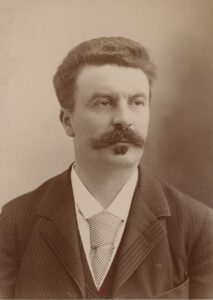Dutch short stories – Learning Dutch through English short stories
Aesop’s Fables – De wolf en de geit
Once upon a time, there was a goat who lived in the forest. The Goat could climb very well. He could climb rocks. He could climb hills. He could climb mountains. He could climb even tall cliffs.
TranslateEr was eens een geit die in het bos leefde. De Geit kon heel goed klimmen. Hij kon op rotsen klimmen. Hij kon heuvels beklimmen. Hij kon bergen beklimmen. Hij kon zelfs hoge kliffen beklimmen.
One day the goat was on the top of the cliff and was having some grass.
A hungry wolf was searching for some food to eat when he saw the goat.
TranslateOp een dag zat de geit op de top van de klif en hij at wat gras.
Een hongerige wolf was op zoek naar wat te eten toen hij de geit zag.
He thought, “The goat is on top of the cliff. I cannot climb the cliff and catch the goat. I must convince the goat to come down.”
TranslateHij dacht: “De geit staat op de top van de klif. Ik kan de klif niet beklimmen en de geit vangen. Ik moet de geit overtuigen om naar beneden te komen.”
He said to the goat, “Mr. Goat, why did you climb the cliff? It is not safe there. If you fall, you will get hurt. You should come down and eat the grass here. The grass here is sweeter than the grass in the cliff.”
TranslateHij zei tegen de geit: “Mr. Geit, waarom ben je de klif beklommen? Daar is het niet veilig. Als je valt, raak je gewond. Je zou naar beneden moeten komen en het gras hier opeten. Het gras is hier zoeter dan het gras in de klif.”
The Goat replied, “I have two questions to you Mr. Wolf. How do you know the grass below is sweeter than the grass here? And why do you care if I fall? I know you well. You are thinking of your own appetite and not mine.”
TranslateDe Geit antwoordde: “Ik heb twee vragen aan u, meneer Wolf. Hoe weet je dat het gras beneden zoeter is dan het gras hier? En wat maakt het jou uit of ik val? Ik ken je goed. Je denkt aan je eigen eetlust en niet aan de mijne.”
Moral: “An invitation prompted by selfishness is not to be accepted.”
TranslateMoraal: “Een uitnodiging die wordt ingegeven door egoïsme, mag niet worden geaccepteerd.”
Hope you had fun learning Dutch through famous English short stories 🙂 If so leave a comment!!!
For more languages:
Learn German through Short stories: https://childhood-stories.com/German
Learn Spanish through Short stories: https://childhood-stories.com/Spanish
Learn Italian through Short stories: https://childhood-stories.com/Italian
Learn Dutch through Short stories: https://childhood-stories.com/Dutch
Learn French through Short stories: https://childhood-stories.com/French
Learn Portuguese through Short stories: https://childhood-stories.com/Portuguese
Learn Portuguese through Short stories: https://childhood-stories.com/English
About: Studying through Dual Language immersion is among the best techniques for learning a new language. The objective of this website is to teach yourself how to read and speak Dutch confidently using English as a base 🙂 These Dutch short stories are super cool to read for beginners and also for entertaining children. Akbar and Birbal Fables are among the best stories that can be studied on a daily basis.




